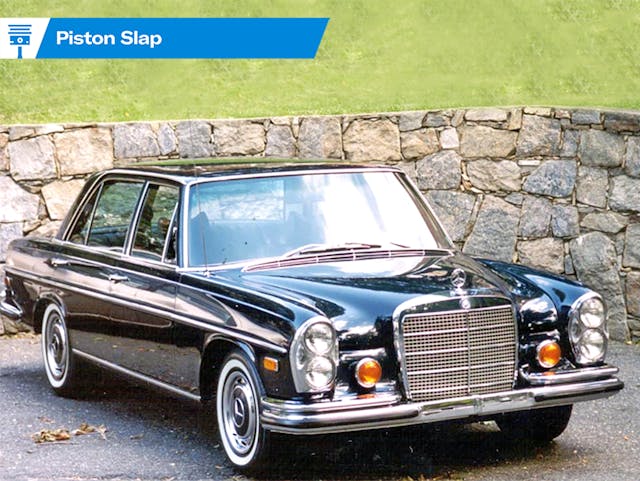Media | Articles
Piston Slap: When the air slide valve loses its glide?

Bill writes:
Hi Sajeev,
I have a quick question about an issue with the air slide valve for my garage-kept 1973 Mercedes-Benz 280 SEL 4.5. I’ve had the problem for over three years, but it’s never been an issue since I don’t drive her that often. Now I’d like to get this repaired. If I sit for long periods of time in traffic, for over 35–45 minutes in gear, the engine starts to idle rough, with the idle starting to slow down to the point where it wants to stall. I have to put my foot on the brake and give her a little gas to prevent her from stalling. I think it’s the air slide valve.
I only drive her periodically on sunny days, not often. She never sees rain or snow, and she hibernates during the colder months through the winter season. But when the engine gets hot from driving an hour or so I also notice if I turn the engine off and then try to restart her again right away, she either won’t start or it’s very hard to start. If I wait until the engine cools down, the car starts right up. Could this also be due to a faulty air slide valve?
Any advice or recommendations would be helpful.
Marketplace
Buy and sell classics with confidence
Sajeev answers:
Idle air control sure has come a long way from the good ‘ol air slide valve, when a thermostatic spring was used to regulate incoming air based on coolant temperature. While later implementations used electric motors, they’re all antiques, thanks to the genius of today’s drive-by-wire throttle assemblies. No matter, I suspect there’s a significant buildup of crud inside your ASV, so a quick removal and a deep clean might be worth it. The video below makes it look easy, provided you have the right tools and just a little bit of courage.
Considering ASV cleaning is almost free (or pretty cheap if you have a mechanic brave enough to work on it), I would absolutely clean it first and see if it helps. While the ASV is removed, check the condition of the rubber hoses, as they should be firm (i.e not gooey), crack-free, and flexible. Replace the hoses if they fail a visual inspection, and consider replacing the ASV if the deep cleaning also fails to give you satisfaction. Who knows, after nearly 50 years of heat cycling, maybe that internal spring lost its progressive-rated sprung?
To your second question, yes, it’s very likely that a malfunctioning ASV can affect re-starts in the same manner. If a cleaned or new ASV doesn’t also fix this problem, check your fuel pressure first. Bosch D (or is this K?) Jetronic systems require specialized knowledge, but doing a near me search with plenty of phone calling will net you a mechanic who has the experience/nerve to work on them.
Have a question you’d like answered on Piston Slap? Send your queries to pistonslap@hagerty.com, give us as much detail as possible so we can help! If you need an expedited resolution, make a post on the Hagerty Community!

